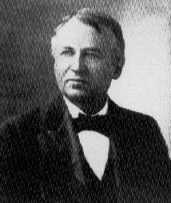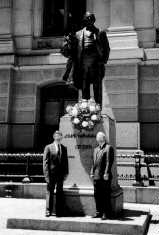



Donald E. Lavender, 33
"Let those who follow me
continue to build with
the plumb of honor,
the level of truth,
and the square of integrity,
education, courtesy and mutuality."
This is the inscription on a tablet in John Wanamaker's Philadelphia store, put there by Wanamaker himself as a guide for those who took over the business following his passing. The Working Tools of Masonry were obviously the guidelines by which Bro. Wanamaker built one of the greatest department stores the world has ever known.
Wanamaker had a real thirst for knowledge as a young boy, and his love for reading led to his carrying books wherever he went. At an early age, he determined he wanted to be a merchant and worked for a while in a Philadelphia clothing store for $6.00 a week. An attack of tuberculosis led to his leaving that job and to a stay in Minnesota where his health improved.
A young man of deep convictions, he became the first paid Secretary of the YMCA in Philadelphia, and he also was involved in Sunday school and other religious activities. His first efforts in the retail business as a part owner were with his brother-in-law in a men's and boys' clothing store. With the advent of the Civil War, business was enhanced. He became the sole owner when his brother-in-law died. By 1872, his store was the largest clothing retailer in the country.
 |
On July 11 every Year, Members of the Grand Lodge of Pennsylvania participate in a wreath-laying ceremony at the statue of Brother John Wanamaker on the east side of Philadelphia's City Hall. Brother Wanamaker (1838-1922) was the Chairman of the Grand Lodge's Committee on Library from 1906 to 1922. Shown in this photo at the statue during the 1995 ceremony are the Rev. Dr. William A. Zulker (left), author of John Wanamaker, King of Merchants, and R.W. Thomas W. Jackson, 33, Grand Secretary, Grand Lodge of Pennsylvania. |
In addition to his successful retail business, Wanamaker had an interest in charitable activities. He served on several boards and committees with wide interests including such philanthropies as Irish Famine Relief and aid to victims of yellow fever in the South.
Wanamaker's expertise in business led to his appointment as Postmaster General under President Benjamin Harrison. As Postmaster General, he was responsible for establishment of rural free delivery and parcel post. Under his guidance, mail deliveries were improved and additional post offices were established.
From the beginning, Wanamaker was an innovator. He established a set price for his merchandise, thus replacing the old process of customers haggling over price. He also was among the first to offer refunds on returned merchandise and to guarantee satisfaction. Always ready to accept new ideas, he established the first day and night phone order business in 1907. He established a Marconi wireless station with towers on top of the store. That station was the first to receive word of the sinking of the Titanic.
Wanamaker was innovative in other ways with a special penchant for advertising. He established a Ford agency in both of his stores. The arrangement was a boon to both Ford and Wanamaker.
In 1911, Wanamaker celebrated 50 years in the retail business and opened a new store in Philadelphia. Brother and President William Howard Taft* (see note at end of article) was present for the opening, and 30,000 people were admitted to the grand opening by ticket only. The Grand Court in the center of the store was seven stories high, and the world's largest pipe organ entertained the select crowd.
That flagship store building enclosed nearly two million square feet, included a 1400-seat auditorium and a restaurant that seated 1,000 people. In the center court is a bronze eagle over six-feet tall weighing 2,500 pounds and mounted on a pedestal of granite weighing 4,500 pounds.
At the 60th anniversary of his business, a meeting was held in Independence Hall at which William Jennings Bryan, the famed orator, spoke honoring Wanamaker as "America's Greatest Merchant."
The University of Pennsylvania conferred upon him a Doctor of Laws degree shortly after the end of World War One. That citation referred to Brother Wanamaker as: "Philanthropist, statesman, eminent in the councils of the nation, Christian Leader, and constructive genius who on the basis of the Golden Rule, by thought and practice has revolutionized the business methods of merchants of the world." Wanamaker died in 1922 at the age of 84.
The 15 Wanamaker stores became a part of the Carter Hawley Hale conglomerate in 1978. In 1986, the stores were sold by Carter Hawley to Woodward and Lothrop Inc. of Washington, DC. In 1976, Wanamaker's flagship store was redecorated maintaining its original style. A further renovation in the past few years has not altered the original style, but did reduce the retail area to approximately 500,000 square feet. A portion of the remaining area became underground parking. The auditorium and a museum were removed, and the huge restaurant is not operational at this writing. The giant pipe organ is still played twice daily, and the grand eagle is still in its place. The store building has been designated as a national landmark.
A member of Friendship Lodge No. 400 in Jenkintown, Pennsylvania, Wanamaker served as Master of that Lodge in 1905. He also was a York Rite Mason in Philadelphia and was coroneted a 33 Inspector General Honorary in the Scottish Rite, N.M.J., in 1913.
*Note: President Taft "expressed a desire to be
a Freemason a year before his presidential candidacy. On Feb. 18, 1909,
he was made a Mason `at sight' within the body of Kilwinning Lodge No.
365, Cincinnati, Ohio.... On this occasion he said: `I am glad to be here,
and to be a Mason; it does me good to feel the thrill that comes from recognizing
on all hands the fatherhood of God and the brotherhood of man.... Many
years ago my father stood in the same place and expressed his love and
admiration of the order.' Both his father and half-brother, Charles P.
Taft, were members of Kilwinning Lodge and his father served as Master."
In later years, Taft made many visitations to Lodges and various Masonic
organizations. He frequently participated in Masonic ceremonies, including
the laying of the cornerstone of The House of the Temple in Washington,
DC, and of The George Washington Masonic National Memorial in Alexandria,
Virginia. At the latter ceremony, also attended by President Calvin Coolidge,
Brother Taft said: "Masonry aims at the promotion of morality and higher
living by the cultivation of the social side of man, the rousing in him
of the instincts of charity and the foundation of the brotherhood of man
and the fatherhood of God." From Denslow's 10,000 Famous Freemasonry, Vol.
4, pp. 215–16.
For more information, visit a related website: www.wanamakerorgan.com.